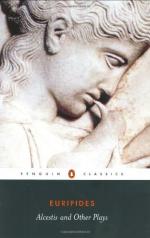|
This section contains 567 words (approx. 2 pages at 400 words per page) |

|
Prologue
The prologue precedes the action of the play with a description of what will happen in the subsequent narrative. This may seem odd to modern theater-goers, who expect to experience surprise in watching a play. But the purpose of theater and therefore the purpose of the prologue was different in ancient Greek times. Fifth century Greek theater was closely aligned with solemn religious ceremony. The audience was attending a ritual performance that was a form of serious entertainment. The topic of the performance would be intimately familiar to all present. The prologue served not to introduce a novel situation but to hint at the subtle variations to a common theme this particular performance would explore. Both Euripides and Sophocles (in his Electro.) explored the same material, yet each author brought his own subtleties to then-respective dramas.
Before Euripides's time, the prologue was spoken, chanted, or sung by a...
|
This section contains 567 words (approx. 2 pages at 400 words per page) |

|




